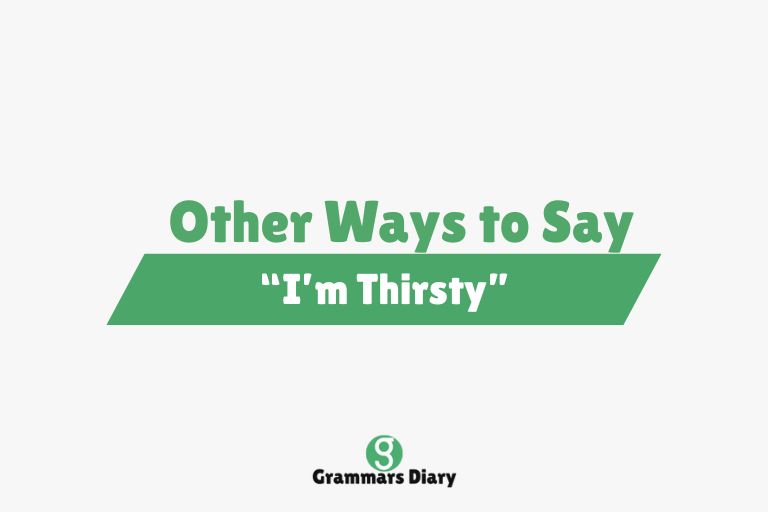The phrase “I’m thirsty” is a direct and universally understood expression that signals a basic physical need for hydration, typically through drinking water or another beverage. Whether you’re in a casual conversation, describing a sensation in a story, or seeking creative ways to express the feeling of needing a drink, having alternatives can enrich your language and help avoid repetition, especially in written or spoken narratives where style and tone matter.
This article offers a comprehensive list of alternative ways to say “I’m thirsty,” spanning formal, informal, creative, and even humorous expressions. Each phrase comes with an example sentence, a clear explanation of the meaning, and an idea of when and where to use it.
Other Ways to Say “I’m Thirsty”
1. I could use a drink.
Example: “After that long walk, I could really use a drink.”
Meaning: This phrase indicates a mild or casual desire for a beverage, usually water or something refreshing.
Usage: Best used in informal situations or when you want to sound relaxed and conversational.
2. I need something to drink.
Example: “I need something to drink before we keep hiking.”
Meaning: A straightforward way to say you require hydration, signaling urgency or basic necessity.
Usage: Common in daily conversations and suitable for all ages and situations.
3. My mouth is dry.
Example: “Sorry, my mouth is dry — I haven’t had water in hours.”
Meaning: Describes a symptom of thirst rather than directly saying you’re thirsty, often used in medical or observational contexts.
Usage: Suitable for clinical settings or when describing physical sensations in more detail.
4. I’m parched.
Example: “I’m absolutely parched after that workout.”
Meaning: An expressive and slightly dramatic way to say you’re very thirsty.
Usage: Common in casual or humorous dialogue and creative writing.
5. I could really go for a cold drink.
Example: “I could really go for a cold drink on a day like this.”
Meaning: This conveys not just thirst but a craving for refreshment, often due to heat or exertion.
Usage: Ideal for relaxed settings, storytelling, or casual conversations.
6. I’m dying of thirst.
Example: “I’m dying of thirst — do you have any water?”
Meaning: A hyperbolic way to express extreme thirst, often meant for emphasis rather than literal interpretation.
Usage: Best used informally or in dramatic storytelling for effect.
7. My throat is dry.
Example: “My throat is dry from all that talking — I need some water.”
Meaning: A physical description that implies thirst without stating it outright.
Usage: Can be used in both casual and semi-formal contexts.
8. I’m dehydrated.
Example: “I think I’m dehydrated — I need to rehydrate soon.”
Meaning: A more medical or scientific way to explain thirst, indicating the body’s need for fluids.
Usage: Suitable in health, fitness, or scientific contexts.
9. I could drink a gallon of water.
Example: “After that hike, I could drink a gallon of water.”
Meaning: A hyperbolic expression showing just how thirsty someone feels.
Usage: Used for dramatic or humorous effect in informal settings.
10. I’m gasping for a drink.
Example: “After that speech, I’m gasping for a drink.”
Meaning: Emphasizes a strong need for a drink, as if breathless or overwhelmed.
Usage: Common in British English and expressive dialogue.
11. I’m craving something cold to drink.
Example: “I’m craving something cold to drink after being out in the sun.”
Meaning: Highlights both thirst and a specific desire for temperature relief.
Usage: Best suited for conversational or descriptive writing contexts.
12. My tongue feels like sandpaper.
Example: “My tongue feels like sandpaper — I need water right now.”
Meaning: A metaphorical way to describe extreme dryness in the mouth due to thirst.
Usage: Often used for dramatic, poetic, or humorous effect in creative writing.
13. I feel like I haven’t had water in days.
Example: “I feel like I haven’t had water in days — where’s the nearest café?”
Meaning: A dramatic exaggeration meant to communicate intense thirst.
Usage: Ideal for casual or humorous tone, often with exaggeration for effect.
14. My body is begging for hydration.
Example: “After that intense gym session, my body is begging for hydration.”
Meaning: A more descriptive and emotive way to show a strong physiological need for fluids.
Usage: Often used in fitness or wellness conversations.
15. I need to rehydrate.
Example: “I need to rehydrate after losing so much sweat during that match.”
Meaning: A technical or health-conscious way of saying you need to drink water or fluids.
Usage: Common in medical, sports, and wellness contexts.
16. I need a glass of water.
Example: “Can you pause the movie? I need a glass of water.”
Meaning: A direct and polite way to indicate thirst, often accompanied by a specific request.
Usage: Very common in casual, domestic, or day-to-day situations.
17. I’ve got cottonmouth.
Example: “I’ve got cottonmouth from all that talking — where’s the water cooler?”
Meaning: A slang term for having a dry mouth, often used informally or humorously.
Usage: Best suited for casual conversations or relaxed dialogue in storytelling.
18. I’m running low on fluids.
Example: “I’m running low on fluids — let’s stop for something to drink.”
Meaning: A creative way to say you’re thirsty, almost like comparing yourself to a machine or vehicle.
Usage: Works well in both humorous and fitness-related contexts.
19. I need to wet my whistle.
Example: “Let me wet my whistle before we get started.”
Meaning: An old-fashioned idiom that means to take a drink, typically of water or another beverage.
Usage: Often used in playful or nostalgic tones, sometimes humorous.
20. I could use some hydration.
Example: “I could use some hydration after biking all morning.”
Meaning: A slightly more formal or health-conscious phrase that reflects the body’s need for fluids.
Usage: Suitable for wellness writing or conversations around physical activity.
21. My lips are chapped — I need water.
Example: “My lips are chapped — I need water before I start peeling them.”
Meaning: Describes a symptom of thirst that draws attention to physical dryness.
Usage: Works in descriptive writing or in situations where physical detail enhances the message.
22. I’m overheating and need a drink.
Example: “I’m overheating and need a drink to cool off.”
Meaning: Combines the sensation of heat with the need for refreshment, often due to weather or exertion.
Usage: Effective in conversations during summer, physical work, or sports.
23. I haven’t had a drink in hours.
Example: “I haven’t had a drink in hours — let’s find a vending machine.”
Meaning: A literal and factual way to explain why one is thirsty.
Usage: Suitable for realistic dialogue or practical conversations.
24. I’m desperate for a drink.
Example: “I’m desperate for a drink — even lukewarm water will do.”
Meaning: Strongly emphasizes the urgency or discomfort caused by thirst.
Usage: Often used in dramatic or high-stakes storytelling and informal speech.
25. My system needs water.
Example: “My system needs water — I feel drained.”
Meaning: Implies a holistic need for hydration, almost like a machine requiring fuel.
Usage: Suitable for fitness discussions, wellness writing, or expressive speech.
When to Use Different “I’m Thirsty” Alternatives
In Professional or Medical Contexts
When speaking in a healthcare, wellness, or scientific environment, it is usually more appropriate to use terms like “I’m dehydrated,” “I need to rehydrate,” or “I’m running low on fluids,” as these convey the physiological need for water in a more technical, objective tone.
In Casual Conversations
In daily conversation, especially with friends or family, simpler and more relatable expressions such as “I need something to drink,” “I’m parched,” or “I could use a drink” tend to sound more natural and human, making them easier to incorporate into everyday speech.
In Creative Writing or Dialogue
If you’re writing dialogue or narrative text, phrases like “My tongue feels like sandpaper,” “I could drink a gallon of water,” or “I need to wet my whistle” can add color, character, and humor to the voice of the speaker or the tone of the scene.
Conclusion
The phrase “I’m thirsty” is simple, clear, and universally understood, but exploring its many alternatives can enrich your speech and writing by adding tone, personality, and nuance. Whether you’re looking for something medical, dramatic, humorous, or poetic, there’s a phrase here that suits your needs and context. By using these varied expressions, you can better match the emotional intensity, formality, or stylistic tone required for any given situation.
For further exploration of vocabulary and phrasing, tools like Thesaurus.com or Merriam-Webster’s synonym resources can help expand your expressive range.
FAQs
What does “I’m thirsty” mean?
“I’m thirsty” is a way of saying that your body needs hydration, often experienced as a dry mouth, a craving for liquid, or general physical discomfort due to lack of fluid intake.
Is “I’m thirsty” formal or informal?
“I’m thirsty” is neutral and can be used in both formal and informal settings, though certain alternatives like “I’m dehydrated” or “I need to rehydrate” may be preferred in medical or health-focused discussions.
Are there creative ways to say “I’m thirsty”?
Yes, creative options such as “My tongue feels like sandpaper” or “I could drink a gallon of water” add vivid imagery and character, making your language more expressive and memorable.











